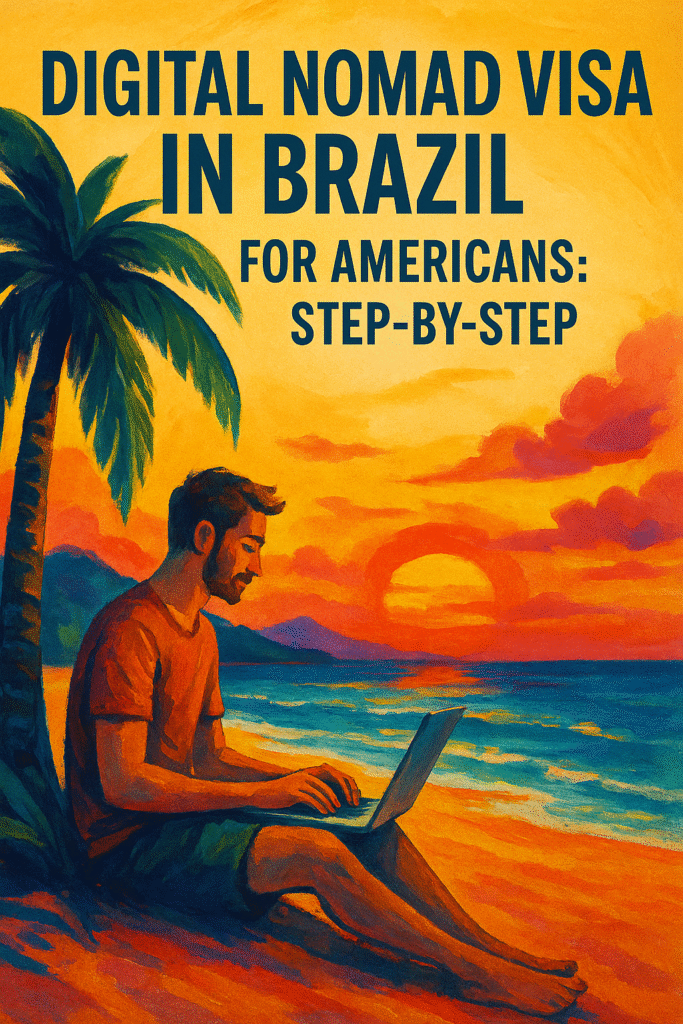Staring at the surf while tapping away on a laptop is no longer an idle fantasy. In the last few years the digital nomad visa in Brazil has turned into a serious option for remote workers from North America and Europe. U.S. citizens regained a tourist‑visa requirement in April 2025, so many Americans are now looking at longer stays and more formal paths to remote work. The digital nomad program lets foreigners work online for employers abroad while living in Brazil. This guide explains the documents you need, the consular process, the cost of living, practical tips and the hidden joys of working remotely from tropical cities.
Why Digital Nomad Visa in Brazil appeals to Americans seeking

Remote workers want more than fast internet and cheap rent. Brazil offers warm weather, rich culture and a welcoming community for Americans and Europeans. The country’s National Immigration Council created a temporary visa that allows people to live in Brazil and work for foreign employers, with an initial residence of one year renewable for another year. There is no requirement to get a local job, and you may remain employed by a U.S. or European company while spending long months in paradise. Applicants must, however, show they have enough income and adequate health insurance. The digital nomad visa is therefore a bridge between leisure and lawful residence.
Connectivity is essential. According to a 2025 survey of mean broadband speeds, Brazil’s average fixed‑broadband download was about 92.8 Mbps, with median speeds reaching 170 Mbps. That’s fast enough for streaming, coding or video calls, and major cities have widespread fibre‑optic service. Data‑only SIM cards and prepaid plans make it easy to stay connected when you’re away from Wi‑Fi. Online life is generally reliable in urban areas, though remote villages may still suffer outages.
Brazil also shines for its cost of living. Groceries, transport and rent cost far less than in the U.S. For example, data compiled from Numbeo in mid‑2024 shows that basic groceries are inexpensive: a litre of milk costs about US$1.15, bread about US$1.66, and eggs around US$2.27. A one‑way ticket on local transport averages US$1.03 while an internet package of 60 Mbps is around US$21.
To put it into context, the average monthly expenses (without rent) are approximately US$578 for a single person and US$2,059 for a family of . Including rent, a single person spends about US$871. These figures translate to roughly R$3,150 to R$4,700 a month or about €520–€780, depending on exchange rates. Lower costs mean digital nomads can enjoy a good quality of life without blowing their budget.
Beyond numbers, Brazil seduces with its cities:
- Florianópolis in Santa Catarina, nicknamed “Magic Island”, is loved by nomads for its beaches, tech community, coworking spaces and laid‑back vibe;
- Rio de Janeiro combines robust infrastructure, modern coworking hubs and the chance to work while gazing at the ocean;
- São Paulo, the country’s business capital, offers countless coworking spaces, a rich cultural scene and diverse cuisine;
- Belo Horizonte mixes friendly hospitality with mountains and a growing arts scene;
- Salvador balances lower living costs with beaches and Afro‑Brazilian culture;
- Curitiba is known for urban planning, numerous parks and fast internet;
- Recife is a tech hub where you can mix remote work with warm‑water beaches;
- Even smaller towns like Itacaré, a surfing paradise on Bahia’s coast, provide sufficient connectivity and a relaxed atmosphere.
Understanding the digital nomad visa in Brazil: general info and eligibility
Brazil’s digital nomad visa is a temporary immigration category known as VITEM XIV. It was established by the National Immigration Council in early 2022 to let foreigners work for foreign employers while living in Brazil. The visa grants an initial stay of one year, renewable for a second year at the Federal Police. To qualify, applicants must show they perform a job or business remotely using information technology and do not maintain an employment relationship with a Brazilian company.
A key condition is financial self‑sufficiency: candidates must earn at least US$1,500 per month or hold US$18,000 in savings. A written statement confirming your ability to work remotely and a contract or service agreement with your foreign employer are necessary. These requirements apply equally to Americans and Europeans, making the visa accessible if you can provide the right documents.
Brazil’s immigration authorities also insist on a valid passport, a visa application form, recent photograph, criminal‑record check, birth certificate and health insurance. The passport must be signed and valid throughout your stay, and the application form must be completed online. Applicants must supply an FBI clearance or local police check, issued within the last six months. A copy of your birth certificate is required, and you’ll need health insurance that covers you in Brazil. Americans should note that these background and civil documents must be apostilled (to certify authenticity) and translated into Portuguese by a sworn translator when you register with the Federal Police later. Failing to provide the correct documents can delay or derail your application.
Documents you need: gathering the paperwork
Preparing your documents ahead of time makes the consular process smoother. Start with the online visa application available through the Brazilian Ministry of Foreign Affairs. Fill out all fields, upload the required documents, submit the form and print the receipt. Make sure the form includes your full name as it appears on your passport and both parents’ names. Sign the printed form inside the designated box with blue or black ink. For Americans married or with children, include spouse and child details even if they are not traveling.
Your passport should be valid for the entire stay and contain at least two blank pages. Add a recent 36 mm × 47 mm photo; it must be printed in color, front view with a white background. A fingerprint or biometric photo is not acceptable. Next is the criminal‑record extract, which must show your city of birth and be stamped in ink. Americans living in the U.S. will likely use an FBI criminal‑record check or a police certificate. If the document is not in English, provide an official translation into English or Portuguese; later you will need a sworn Portuguese translation for the final registration.
The digital nomad visa in Brazil also demands proof of income and employment. Prepare a written declaration explaining that your work can be performed remotely and attach a contract or service agreement with your employer or clients. Provide bank statements or payslips to show you earn at least US$1,500 per month or have US$18,000 in savings. Health‑insurance certificates must be valid in Brazil and cover medical expenses during your stay. Copy your birth certificate and have it apostilled and translated. Double‑check every item against the consulate’s checklist because missing documents are the most common reason for delays in the consular process.
Step‑by‑step consular process for the digital nomad visa in Brazil
Once your documents are ready, it’s time to navigate the consular process. Although procedures vary slightly by consulate, the core steps are similar for Americans and Europeans.
Submit the online application and prepare physical documents. After completing the electronic form and uploading your documents, print the receipt and assemble paper originals. Each consulate requires you to send or deliver the complete package. The Brazilian Embassy in Finland, for example, instructs applicants to send the visa application and all original documents by mail or drop them off in a dedicated mailbox during specific hours. Incomplete applications are returned. Make copies of everything for your records.
Wait for confirmation and pay the fee. Do not pay the fee until the consulate reviews your packet. The Helsinki Consular Section states that the consular process fee for a digital nomad visa in Brazil is €120, which at the time of writing is about US$139 or R$770. Some consulates may charge slightly different fees based on reciprocity agreements. Once your documents are accepted, you will receive instructions on how to transfer the fee. Payments made before the consulate requests them may be rejected. Keep proof of payment; you may need to show it when you collect your passport.
Processing time and collection. After receiving your documents and payment, the consulate typically processes the application in about five working days. This timeframe can extend if the consulate must consult the Ministry of External Relations or if there is a high workload. Plan your travel accordingly and avoid making irrevocable bookings until you have the visa. Some consulates require you to collect your passport in person; others may mail it back if you provide a self‑addressed envelope.
Registration with the Federal Police and CPF. Holding a digital nomad visa in Brazil isn’t the end of the consular process. You must register with the Federal Police within 90 days of your first entry. Bring your passport, printed application form, apostilled and translated birth certificate, and criminal‑record extract.
Each document must carry an apostille or consular legalization and be translated into Portuguese by a sworn translator. After registration, you will receive an ID card (Carteira de Registro Nacional Migratório). Authorities also recommend that foreigners obtain a Brazilian CPF (taxpayer number) before or shortly after arrival. The CPF is needed to open a bank account, rent an apartment, buy mobile services and carry out many daily transactions. Americans can apply for a CPF at Brazilian embassies or at the Federal Police after arriving.
Living in Brazil as a digital nomad: cities, costs & internet

With the visa secured, the fun begins. Choosing where to live depends on your interests and work needs. Below are some options with highlights drawn from local experts and digital nomads.
Florianópolis (Santa Catarina). Known as the “Magic Island”, Florianópolis offers beautiful beaches and a thriving tech scene. The city has plenty of coworking spaces and a laid‑back vibe. You can surf in the morning, work from a coworking hub like Impact Hub Floripa, and eat fresh seafood by evening. Rent for a one‑bedroom apartment in the city centre averages US$452 per month (about R$2,520 or €390) and even less outside the centre. Tap water is safe to drink in most neighbourhoods, though it may have a chlorine taste.
Rio de Janeiro (Rio de Janeiro). Rio is famous for its beaches, samba and carnival, but it also has reliable infrastructure and coworking spaces. The city combines scenic beauty with city amenities. Working from a café near Copacabana can be inspiring, but be mindful of petty theft and avoid flaunting electronics. A one‑bedroom flat in the city centre costs around US$473 per month (roughly R$2,645 or €410). Internet and coworking fees are similar to São Paulo.
São Paulo (São Paulo). Brazil’s financial heart is ideal for those who need business connections or prefer a metropolitan feel. It offers countless coworking options, an energetic cultural scene and world‑class restaurants. However, traffic is intense, and air quality can suffer. Rent in central São Paulo averages US$560 per month (about R$3,125 or €485), but neighbourhoods like Vila Madalena or Pinheiros offer quiet pockets with art galleries and cafés. Safety varies by area; research neighbourhoods and stay vigilant.
Belo Horizonte and Salvador. Belo Horizonte (Minas Gerais) provides a friendly atmosphere, nearby mountains and a burgeoning cultural scene. Salvador (Bahia) blends Afro‑Brazilian heritage, colourful colonial architecture and lower living costs. Rent in Belo Horizonte’s centre hovers around US$393 per month, while Salvador is similar or slightly cheaper. Health care is widely available, though private insurance is recommended. In both cities you can explore markets, live music and beach life.
Curitiba and Recife. Curitiba is praised for its urban planning, green spaces and fast internet. It’s quieter than Rio or São Paulo and ideal if you appreciate order and cool weather (average winter temperature around 17 °C / 63 °F). Recife, on the Northeast coast, hosts Porto Digital, one of Brazil’s largest tech clusters. It mixes innovation with warm‑water beaches and a vibrant arts scene. Rents range from US$320–US$450 depending on the neighbourhood. Crime rates in Recife vary; stay in well‑known districts and use ride‑hailing apps at night.
Itacaré and other small towns. Those seeking tranquility may prefer Itacaré, a surf town on Bahia’s coast with sufficient internet and a relaxed pace. Here you can rent a room for US$300 (about R$1,675 or €260) and live close to the beach. A digital nomad community is growing, and the cost of living is low. Other emerging spots include Belém and Manaus in the Amazon region, where coworking spaces are appearing. The humidity is high, so keep electronics protected.
Internet quality remains a prime factor. Brazil’s average fixed‑broadband download speed of 92.8 Mbps means video calls and cloud work are smooth. Mobile data speeds average 73.1 Mbps, allowing you to work from beaches or parks. However, backup your data and use surge protectors; occasional power cuts can occur during storms. Coworking spaces often have generators and battery backups. Many cafés post their Wi‑Fi speeds and welcome remote workers, though it’s polite to purchase drinks or food if you occupy a table for hours.
Taxes, safety & practical tips

Taxes and residency
Holding a digital nomad visa in Brazil does not automatically make you a tax resident. Under Brazilian law, foreigners become tax residents when they complete 183 days of physical presence in a 12‑month period. Tax residents pay progressive income tax on worldwide income ranging from 0 % to 27.5 %. There is no tax treaty between Brazil and the U.S., so Americans must continue filing U.S. tax returns and may owe Brazilian taxes if they exceed the residency threshold. The Foreign Earned Income Exclusion and foreign tax credits can alleviate double taxation, but consult a tax professional. Digital nomads who stay less than 183 days typically pay taxes only in their home country.
Safety and health
Brazil’s reputation for crime makes some Americans hesitant, yet day‑to‑day safety varies widely. Major tourist areas have visible police presence. Petty theft is the most common crime; avoid carrying large amounts of cash, keep electronics discreet and use ride‑hailing services at night. In rural towns like Itacaré or Florianópolis, crime rates are lower. Always listen to local advice and choose accommodation in safe districts.
Healthcare is a mix of public and private. The public system, SUS, is free but often overcrowded; private insurance is essential for digital nomads. Plans from major providers cost around US$100–US$150 per month (roughly R$560–R$840 or €90–€135). Many doctors speak English in large cities, but having a Portuguese‑speaking friend helps navigate appointments. Bring a supply of prescription medications and keep copies of your documents in case of emergencies.
Cultural and practical tips
Learning basic Portuguese opens doors. While many Brazilians in tourist zones know some English, locals appreciate even simple greetings and phrases. Brazilians are warm and informal; expect handshakes, hugs and kisses on the cheek in social settings. The concept of time is flexible; meetings may start late. Adapting to this rhythm reduces frustration.
Obtaining a CPF number is vital for daily life . Without it, you cannot sign a mobile‑phone contract, rent an apartment long‑term, purchase goods online or register with streaming services. You can apply for a CPF at Brazilian consulates before traveling or at the Federal Police after arrival. Keep your documents (passport, proof of address and application form) handy during this consular process.
Renting property often requires a fiador (guarantor) or a deposit equal to three months’ rent. Digital nomads can avoid bureaucratic leases by using Airbnb or co‑living spaces. Airbnb costs range from US$300 a month in smaller towns to US$800 in Rio or São Paulo. Co‑living communities like Selina offer packages that include accommodation, coworking and social events. Always check internet speed, location and safety reviews.
Environmental and climate considerations
Brazil spans multiple climate zones. Rio de Janeiro enjoys a tropical climate with temperatures around 27 °C (81 °F) in summer and 21 °C (70 °F) in winter. Curitiba has milder summers (25 °C / 77 °F) and chilly winters (13 °C / 55 °F). The Amazon region is hot and humid year‑round, while the south experiences occasional cold fronts. Pack accordingly and use sunscreen; the UV index can be high. During the rainy season (usually summer), storms may cause flooding or electricity outages, so maintain surge protectors and battery backups.
Conclusion: start your Brazilian digital nomad journey
Brazil’s digital nomad visa is more than a bureaucratic tool; it’s an invitation to experience South America’s largest country in depth. By following the steps above—gathering the right documents, understanding the consular process, meeting the income requirements and registering properly—you can live legally in Brazil while keeping your U.S. or European job.
A disciplined approach will avoid delays. After arrival, take time to explore: from Florianópolis’s surf beaches to São Paulo’s urban sprawl and the historic streets of Salvador, there is a place for every lifestyle. Affordable living costs, decent broadband speeds and vibrant culture mean that Americans and Europeans can enjoy a high quality of life at a fraction of the price they pay at home. Remember to respect local customs, learn some Portuguese, stay safe and take care of your health. With thoughtful planning, your Brazilian adventure can be both productive and unforgettable.
References
Brazilian Ministry of Foreign Affairs – Digital Nomads Visa (Vitem XIV): eligibility criteria, required documents and income thresholdsgov.br. Link
Exchange‑Rates.org – USD to BRL exchange rates (August 2025): average rate of 1 USD ≈ 5.47 BRLexchange-rates.org. Link
Exchange‑Rates.org – EUR to BRL exchange rates (August 2025): average rate of 1 EUR ≈ 6.36 BRLexchange-rates.org. Link
Numbeo – Cost of living in Rio de Janeiro (Aug 2025): monthly costs for single and family; sample pricesnumbeo.com. Link
Timeanddate.com – Climate data for Rio de Janeiro: average high and low temperaturestimeanddate.com. Link






